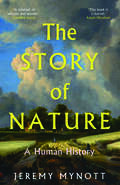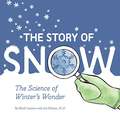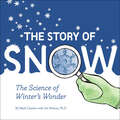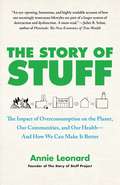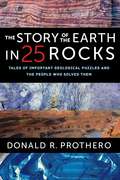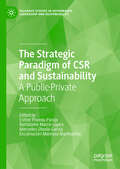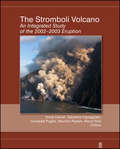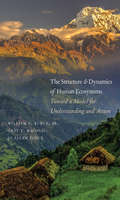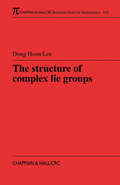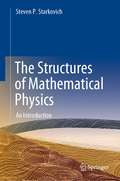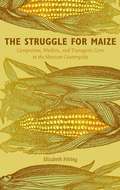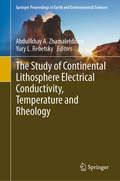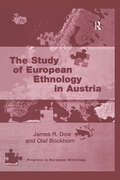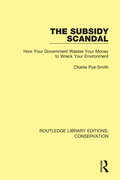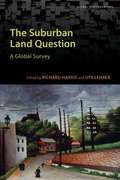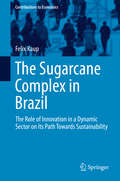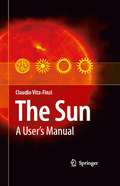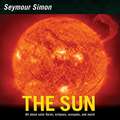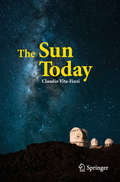- Table View
- List View
The Story of Nature: A Human History
by Jeremy MynottThe story of humanity&’s evolving relationship with the natural world from pre-history to the present day Nature has long been the source of human curiosity and wonderment, and the inspiration for some of our deepest creative impulses. But we are now witnessing its rapid impoverishment, even destruction, in much of our world. In this beautifully illustrated book, Jeremy Mynott traces the story of nature—past, present, and future. From the dramatic depictions of animals by the prehistoric cave-painters, through the romantic discovery of landscape in the eighteenth century, to the climate emergency of the present day, Mynott looks at the different ways in which humankind has understood the world around it. Charting how our ideas about nature emerged and changed over time, he reveals how the impulse to control nature has deep historical roots. As we reach an environmental crisis point, this vital study shows how human imagination and wonder can play a restorative role—and reveal what nature ultimately means to us.
The Story of Snow: The Science Of Winter's Wonder (Into Reading, Read Aloud Module 6 #2)
by Mark Cassino Jon Nelson Nora AoyagiNIMAC-sourced textbook <p><p> How do snow crystals form? What shapes can they take? Are no two snow crystals alike? These questions and more are answered inside this exploration of the science of snow, featuring photos of real snow crystals in all their beautiful diversity. Perfect for reading on winter days, this book by a nature photographer and a snow scientist will inspire wonder and curiosity about the marvels of snow. Snowflake-catching instructions are also included for aspiring young snow scientists!
The Story of Snow: The Science of Winter's Wonder
by Mark Cassino Jon NelsonHow do snow crystals form? What shapes can they take? Are no two snow crystals alike? These questions and more are answered in this visually stunning exploration of the science of snow. Perfect for reading on winter days, the book features photos of real snow crystals in their beautiful diversity. Snowflake-catching instructions are also included.
The Story of Stuff: How Our Obsession with Stuff Is Trashing the Planet, Our Communities, and Our Health-and a Vision for Change
by Annie LeonardA classic exposé in company with An Inconvenient Truth and Silent Spring, The Story of Stuff expands on the celebrated documentary exploring the threat of overconsumption on the environment, economy, and our health. Leonard examines the &“stuff&” we use everyday, offering a galvanizing critique and steps for a changed planet.The Story of Stuff was received with widespread enthusiasm in hardcover, by everyone from Stephen Colbert to Tavis Smiley to George Stephanopolous on Good Morning America, as well as far-reaching print and blog coverage. Uncovering and communicating a critically important idea—that there is an intentional system behind our patterns of consumption and disposal—Annie Leonard transforms how we think about our lives and our relationship to the planet. From sneaking into factories and dumps around the world to visiting textile workers in Haiti and children mining coltan for cell phones in the Congo, Leonard, named one of Time magazine’s 100 environmental heroes of 2009, highlights each step of the materials economy and its actual effect on the earth and the people who live near sites like these. With curiosity, compassion, and humor, Leonard shares concrete steps for taking action at the individual and political level that will bring about sustainability, community health, and economic justice. Embraced by teachers, parents, churches, community centers, activists, and everyday readers, The Story of Stuff will be a long-lived classic.
The Story of the Earth in 25 Rocks: Tales of Important Geological Puzzles and the People Who Solved Them
by Donald R. ProtheroEvery rock is a tangible trace of the earth’s past. The Story of the Earth in 25 Rocks tells the fascinating stories behind the discoveries that shook the foundations of geology. In twenty-five chapters—each about a particular rock, outcrop, or geologic phenomenon—Donald R. Prothero recounts the scientific detective work that shaped our understanding of geology, from the unearthing of exemplary specimens to tectonic shifts in how we view the inner workings of our planet. Prothero follows in the footsteps of the scientists who asked—and answered—geology’s biggest questions: How do we know how old the earth is? What happened to the supercontinent Pangea? How did ocean rocks end up at the top of Mount Everest? What can we learn about our planet from meteorites and moon rocks? He answers these questions through expertly chosen case studies, such as Pliny the Younger’s firsthand account of the eruption of Vesuvius; the granite outcrops that led a Scottish scientist to theorize that the landscapes he witnessed were far older than Noah’s Flood; the salt and gypsum deposits under the Mediterranean Sea that indicate that it was once a desert; and how trying to date the age of meteorites revealed the dangers of lead poisoning. Each of these breakthroughs filled in a piece of the greater puzzle that is the earth, with scientific discoveries dovetailing with each other to offer an increasingly coherent image of the geologic past. Summarizing a wealth of information in an entertaining, approachable style, The Story of the Earth in 25 Rocks is essential reading for the armchair geologist, the rock hound, and all who are curious about the earth beneath their feet.
The Story of the Gold at Sutter's Mill (Cornerstones of Freedom)
by R. Conrad SteinPresents the scene in California after gold was discovered on John Sutter's land in 1849 and the subsequent fortunes made and hearts broken.
The Story of the Johnstown Flood (Cornerstones of Freedom)
by R. Conrad SteinDescribes the devastating tidal wave that hit the city of Johnstown and several Pennsylvania villages on Memorial Day, 1889, when the South Fork Dam above the city collapsed as a result of spring rains.
The Story of the San Francisco Earthquake (Cornerstones of Freedom)
by R. Conrad SteinDescribes the devastating earthquake and ensuing fire that destroyed much of San Francisco in the spring of 1906.
The Strategic Paradigm of CSR and Sustainability: A Public-Private Approach (Palgrave Studies in Governance, Leadership and Responsibility)
by Bartolomé Marco-Lajara Esther Poveda-Pareja Mercedes Úbeda-García Encarnación Manresa-MarhuendaIt has become increasingly clear that promotion of sustainability initiatives by governments and other public institutions alone is not enough to bring about the necessary progress in tackling the ‘Grand Challenges’ of climate change and inequality. A higher level of involvement is required from companies, as the main agents of economic development. Therefore, research is needed to determine how the desired levels of sustainability can be achieved through each of the spheres (public and private) as well as by considering collaboration between both. This book analyses Corporate Social Responsibility (CSR) and sustainability from a public-private perspective, considering the actions of stakeholders belonging to both the private and public scopes, their ability to collaborate and the paradigmatic relationship between CSR and sustainability as it moves across the public and private spheres. It will be of great interest to students and scholars of sustainability strategy, CSR, policy and corporate governance, as well as internal and external stakeholders engaged in corporate policy and strategic management.
The Stratosphere: Dynamics, Transport, and Chemistry
by L. M. Polvani A. H. Sobel D. W. WaughPublished by the American Geophysical Union as part of the Geophysical Monograph Series, Volume 190. <P><P> The Stratosphere: Dynamics, Transport, and Chemistry is the first volume in 20 years that offers a comprehensive review of the Earth's stratosphere, increasingly recognized as an important component of the climate system. The volume addresses key advances in our understanding of the stratospheric circulation and transport and summarizes the last two decades of research to provide a concise yet comprehensive overview of the state of the field. This monograph reviews many important aspects of the dynamics, transport, and chemistry of the stratosphere by some of the world's leading experts, including up-to-date discussions of Dynamics of stratospheric polar vortices Chemistry and dynamics of the ozone hole Role of solar variability in the stratosphere Effect of gravity waves in the stratosphere Importance of atmospheric annular modes This volume will be of interest to graduate students and scientists who wish to learn more about the stratosphere. It will also be useful to atmospheric science departments as a textbook for classes on the stratosphere.
The Stromboli Volcano
by Maurizio Ripepe Sonia Calvari Giuseppe Puglisi Salvatore Inguaggiato Mauro RosiPublished by the American Geophysical Union as part of the Geophysical Monograph Series, Volume 182.This book presents a study of the "eruptive crisis" that took place at the Stromboli volcano from December 2002 to July 2003.<P><P> It features an integrative approach to the monitoring of eruptive activity, including lava flow output, explosive activity, flank instability, submarine and subaerial landslides, tsunami, paroxysmal explosive events, and mitigation strategies.The book comes with a DVD with spectacular photos and video ofThe landslide and the tsunami that hit the coast of the island;The 5 April 2003 paroxysmal event;The whole eruption showing the stages of effusive activity and growth of the lava flow field;Selected data useful for testing geochemical, petrological, seismological, thermal, and ground deformation models.This multidisciplinary and multimedia experience, unique for the amount, quality, and variety of data it covers, can be applied to other active volcanoes. Stromboli will appeal to solid Earth scientists and students working in seismology, geodynamics, geochemistry, and mineral physics, as well as nonspecialists with an interest in the inner workings of our planet and others.
The Structure and Dynamics of Human Ecosystems: Toward a Model for Understanding and Action
by William R. Burch Gary E. Machlis Jo Ellen ForceA landmark book that strives to provide both grand theory and practical application, innovatively describing the structure and dynamics of human ecosystems As the world faces ever more complex and demanding environmental and social challenges, the need for interdisciplinary models and practical guidance becomes acute. The Human Ecosystem Model described in this landmark book provides an innovative response. Broad in scope, detailed in method, at once theoretical and applied, this grand study offers an in-depth understanding of human ecosystems and tools for action. The authors draw from Goethe’s Faust, classic anthropology and sociology studies, contemporary ecosystem ecology, Buddhist ethics, and more to create a paradigm-shifting model and a major advance in interdisciplinary ecology.
The Structure of Complex Lie Groups (Chapman & Hall/CRC Research Notes in Mathematics Series)
by Dong Hoon LeeComplex Lie groups have often been used as auxiliaries in the study of real Lie groups in areas such as differential geometry and representation theory. To date, however, no book has fully explored and developed their structural aspects.The Structure of Complex Lie Groups addresses this need. Self-contained, it begins with general concepts
The Structures of Mathematical Physics: An Introduction
by Steven P. StarkovichThis textbook serves as an introduction to groups, rings, fields, vector and tensor spaces, algebras, topological spaces, differentiable manifolds and Lie groups --- mathematical structures which are foundational to modern theoretical physics. It is aimed primarily at undergraduate students in physics and mathematics with no previous background in these topics. Applications to physics --- such as the metric tensor of special relativity, the symplectic structures associated with Hamilton's equations and the Generalized Stokes's Theorem --- appear at appropriate places in the text. Worked examples, end-of-chapter problems (many with hints and some with answers) and guides to further reading make this an excellent book for self-study. Upon completing this book the reader will be well prepared to delve more deeply into advanced texts and specialized monographs in theoretical physics or mathematics.
The Struggle for Maize: Campesinos, Workers, and Transgenic Corn in the Mexican Countryside
by Elizabeth FittingWhen scientists discovered transgenes in local Mexican corn varieties in 2001, their findings intensified a debate about not only the import of genetically modified (GM) maize into Mexico but also the fate of the peasantry under neoliberal globalization. While the controversy initially focused on the extent to which gene flow from transgenic to local varieties threatens maize biodiversity, anti-GM activists emphasized the cultural significance of the crop in Mexico and demanded that campesinos and consumers have a voice in the creation of GM maize and rural policies. In The Struggle for Maize, Elizabeth Fitting explores the competing claims of the GM corn debate in relation to the livelihood struggles of small-scale maize producers, migrants, and maquiladora workers from the southern Tehuacn Valley. She argues that the region's biodiversity is affected by state policies that seek to transform campesinos into entrepreneurs and rural residents into transnational migrant laborers. While corn production and a campesino identity remain important to an older generation, younger residents have little knowledge of or interest in maize agriculture; they seek out wage labor in maquiladoras and the United States. Fitting's ethnography illustrates how agricultural producers and their families respond creatively to economic hardship and Mexico's "neoliberal corn regime," which promotes market liberalization, agricultural "efficiency," and the reduction of state services over domestic maize production and food sovereignty.
The Study of Continental Lithosphere Electrical Conductivity, Temperature and Rheology (Springer Proceedings in Earth and Environmental Sciences)
by Abdullkhay A. Zhamaletdinov Yury L. RebetskyThis proceedings book investigates the possibilities for creating new models of the continental lithosphere structure by integrating methods from geothermodynamics and deep geoelectrics. It particularly focuses on the use of powerful controlled sources of electromagnetic field to study the nature of deep geophysical boundaries. It also presents research related to the transition boundary between the brittle and quasiplastic states of Earth’s crust matter and the position of creep areas in Earth’s crust, as well as geothermal and rheological studies in combination with the deep electromagnetic soundings – a promising direction that allows the tectonophysical reconstruction of natural stresses in the lithosphere. The experimental study results and tectonophysical modeling are discussed in the context of the Fennoscandinavian shield, the Indian Craton, the Himalayas, Eastern Tibet and the Eurasian continent as a whole. The book appeals to researchers interested in solid Earth physics.
The Study of European Ethnology in Austria (Progress in European Ethnology)
by James R. Dow Olaf BockhornThe study of ethnology or ’Volkskunde’ in Austria has had a troubled past. Through most of the 20th century it was under the influence of the so-called Viennese ’Mythological School’ and the controversy between the two opposing branches, the ’Ritualist’ and the ’Mythologists', set much of the agenda from the 1920s until long after the World War ended in 1945. The volume examines two Austrian characters, Richard Wolfram and Karl Haiding, and the impact of their research and sets them in the context of Austrian ethnology before, during and after the war years. The book concludes by examining the present day ethnological outlook in the country.
The Subsidy Scandal: How Your Government Wastes Your Money to Wreck Your Environment (Routledge Library Editions: Conservation #7)
by Charlie Pye-SmithOriginally published in 2002, The Subsidy Scandal examines the subsidies spent by governments and the affect this has had on the environment. The book examines industries ranging from agriculture to mining, energy to transport and the subsidies spent on these industries by government. The book argues that these industries have had a negative impact on the environment, often funded through government subsidies derived from public taxes. The book suggests that these subsidies go to those who least need them – frequently to corporations and special interest groups which recycle some of the funds to support the politicians who keep the subsidies going. Based on research in North America, with examples from Europe and elsewhere, the book provides an investigative report into to the money assigned to environmental policies to find out where the money goes and what produces it.
The Suburban Land Question: A Global Survey (Global Suburbanisms)
by Richard Harris Ute LehrerAs part of the urbanization process, suburban development involves the conversion of rural land to urban use. When discussing the suburbs, most writers focus on particular countries in the northern hemisphere, implying that patterns and processes elsewhere are fundamentally different. The purpose of The Suburban Land Question is to identify the common elements of suburban development, focusing on issues associated with the scale and pace of rapid urbanization around the world. Editors Richard Harris and Ute Lehrer and a diverse group of contributors draw on a variety of sources, including official data, planning documents, newspapers, interviews, photographs, and field observations to explore the pattern, process, and planning of suburban land development. Featuring case studies from major world regions, including China, India, Latin America, South Africa, as well as France, Austria, the Netherlands, the United States, and Canada, the volume identifies and discusses the peculiarly transitional character of suburban land. In addition to place and time, The Suburban Land Question addresses the many elements that distinguish land development in urban fringe areas, including economy, social infrastructure, and legality.
The Sugarcane Complex in Brazil
by Felix KaupThis book offers an in-depth analysis of the Brazilian sugarcane complex with a special focus on technological advances that promote sustainable development. It first examines the question why sugarcane-based ethanol from Brazil is considered a superior alternative to fossil fuel compared to other biofuels produced on an industrial scale and subsequently analyzes the most dynamic areas within the sugarcane sector with regard to relevant actors, technologies and markets in order to determine if the sector can be considered an innovation system. The empirical research presented here is based on multiple research methods and derives its data from interviews with Brazilian experts of the sugarcane sector and by a thorough literature review. The book will be of special interest to researchers and practitioners interested in understanding the key mechanisms in successful innovation systems that promote a transition towards sustainable development and mobility.
The Sun
by Claudio Vita-FinziThis is an account of the many ways in which the Sun affects our planet, how its influence has changed over the last few centuries and millennia, and the extent to which we can predict its future impact. The book is the first to integrate astronomical, geological, climatic and social aspects of the Sun. It includes a topical treatment of solar contribution to global warming, and demonstrates how wild and variable is the so-called Solar Constant. Our nearest star is a complex machine which needs to be treated with caution, and this book will equip every reader with the knowledge that is required to understand the benefits and dangers it can bring.
The Sun (Seymour Simon Science Ser.)
by Seymour SimonIn this completely updated edition of The Sun featuring beautiful full-color photographs, Seymour Simon presents a fascinating introduction to the star that is the center of our Solar System.Young readers will love exploring the wonders of the sun, from the constant nuclear explosions at its core to the sea of boiling gases that forms its surface.Seymour Simon knows how to explain science to kids and make it fun. He was a teacher for more than twenty years, has written more than 250 books, and has won multiple awards.This book includes an author's note, glossary, and index and supports the Common Core Learning Standards, Next Generation Science Standards, and the Science, Technology, Engineering, and Math (STEM) standards.
The Sun Today
by Claudio Vita-FinziThere are several billion stars in the Milky Way galaxy. One of them is the middle-aged G2V yellow dwarf that rules our lives. The Sun Today discusses the Sun’s appearance and composition, its internal workings, and the various kinds of radiation it emits, and it puts forward a novel explanation for coronal heating. The book draws on the findings of telescopic observation, space missions, and technical and theoretical advances in many fields, and shows why we need to know more if we are to understand and manage our foothold in the Universe.
